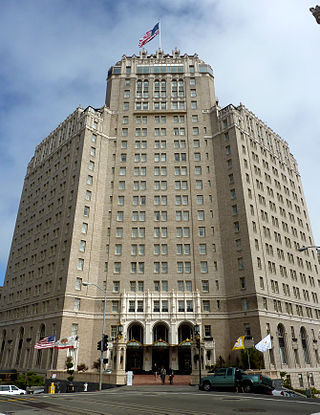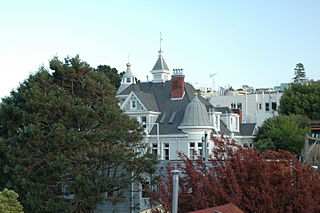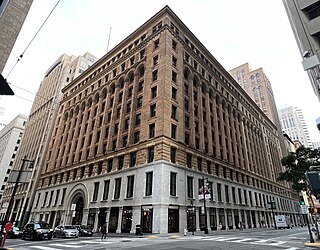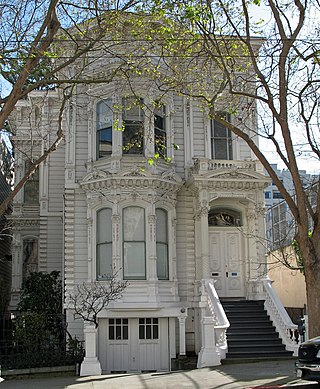
James Graham Fair was an Irish immigrant to the United States who became a highly successful mining engineer and businessman. His investments in silver mines in Nevada made him a millionaire, and he was one of the famous "silver kings" who became wealthy on the Comstock Lode. Fair later became a real estate investor and railroad builder in California. In 1881, he was elected a United States Senator from Nevada. Nearly all other major so-called robber barons were Protestants while Fair himself died a Roman Catholic though born into poverty to Anglican parents.

In American architecture, painted ladies are Victorian and Edwardian houses and buildings repainted, starting in the 1960s, in three or more colors that embellish or enhance their architectural details. The term was first used for San Francisco Victorian houses by Elizabeth Pomada and Michael Larsen in their 1978 book Painted Ladies: San Francisco's Resplendent Victorians. Although polychrome decoration was common in the Victorian era, the colors used on these houses are not based on historical precedent.

Russian Hill is a neighborhood of San Francisco, California. It is named after one of San Francisco's 44 hills, and one of its original "Seven Hills".

Union Square is a 2.6-acre (1.1-hectare) public plaza bordered by Geary, Powell, Post, and Stockton Streets in downtown San Francisco, California. "Union Square" also refers to the central shopping, hotel, and theater district that surrounds the plaza for several blocks. The area got its name because it was once used for Thomas Starr King rallies and support for the Union Army during the American Civil War, earning its designation as a California Historical Landmark. Despite its declining profile, Union Square in San Francisco is still a major retail hub for the city.

Pacific Heights is a neighborhood in San Francisco, California, United States. It has panoramic views of the Golden Gate Bridge, San Francisco Bay, the Palace of Fine Arts, Alcatraz, and the Presidio.

The InterContinental Mark Hopkins San Francisco is a luxury hotel located at the top of Nob Hill in San Francisco, California. The hotel is managed by the InterContinental Hotels Group. The chain operates over 5,000 hotels and resorts in approximately 75 nations. The Mark Hopkins is the oldest InterContinental in the United States.

Embarcadero Center is a commercial complex of four office towers, two hotels, a shopping center with more than 125 stores, bars, and restaurants, and a fitness center on three levels located in San Francisco, California. There is an outdoor ice skating rink during winter months. Embarcadero Center sits on a 9.8-acre (4.0 ha) site largely bounded by Clay Street, Sacramento Street, Battery Street, and the Embarcadero, in the financial district of San Francisco.

The Russ Building is a Neo-Gothic office tower located in the Financial District of San Francisco, California. It was designed by architect George W. Kelham, who was responsible for many of San Francisco's other prominent high-rise buildings in the 1920s. The 133-metre (436 ft) building was completed in 1927 and had 32 floors as well as the city's first indoor parking garage. It was the tallest building in San Francisco from 1927 to 1964 and one of the most prominent, along with its 133-metre (436 ft) "twin", the PacBell Building to the south.

The Hobart Building is an office high rise located at 582–592 Market Street, near Montgomery and 2nd Streets, in the financial district of San Francisco, California. It was completed in 1914. It was at the time the second tallest building in the city, at 21 floors and 87 m (285 ft). It was designed by Willis Polk.

The Alfred E. Clarke Mansion, also known as the Caselli Mansion, Nobby Clarke's Castle and Nobby Clarke's Folly, is a mansion at 250 Douglass Street on the corner of Caselli Avenue in Eureka Valley, San Francisco, California. Built in 1891 by Alfred "Nobby" Clarke, it has been a hospital and is now an apartment building. It became a San Francisco Designated Landmark in 1975.
Hosfelt Gallery in San Francisco, California was founded in 1996 by Todd Hosfelt to exhibit contemporary international artists working in all media.

The Mills Building and Tower is a two-building complex following the Chicago school with Romanesque design elements in the Financial District of San Francisco, California. The structures were declared San Francisco Designated Landmark #76, and were listed on the National Register of Historic Places in 1974.

The Third and Townsend Depot was the main train station in the city of San Francisco for much of the first three quarters of the 20th century. The station at Third Street and Townsend Street served as the northern terminus for Southern Pacific's Peninsula Commute line between San Francisco and San Jose and long-distance trains between San Francisco and Los Angeles via the Southern Pacific's Coast Line. For service for destinations to the north, such as Seattle, and destinations to the east, such as Chicago, passengers generally needed to travel to Oakland, initially on ferries to Oakland Long Wharf, and later on buses to 16th Street Station. It was demolished in the 1970s and replaced by the Caltrain commuter station a block away at Fourth and King Streets.

The C. A. Belden House is a historic building in the Pacific Heights neighborhood of San Francisco, California, United States. It was designed by Walter J. Mathews in the Queen Anne style and completed in 1889.

The Frank G. Edwards House is a historic residential building built in 1883, and located at 1366 Guerrero Street in the Noe Valley section of San Francisco, California.

Bourn Mansion is a historic home built in 1896, and located at 2550 Webster Street in the Pacific Heights neighborhood of San Francisco, California.

The Stadtmuller House, or F. D. Stadtmuller House, is a historic house built in 1880, and located in the Western Addition neighborhood of San Francisco, California. It is notable for its architecture.

The Atkinson House is a historic house built in 1853, and located in the Russian Hill area of San Francisco, California. It is one of the oldest residences in the city still standing, and possibly one of the first Italianate-style homes in the city. It is also known as the Katherine Atkinson House, and Atkinson-Escher House.

The Bush Street–Cottage Row Historic District is a historic district located in the Japantown area of San Francisco, California, U.S.. The area is a residential enclave comprising 20 historical residences, a walkway, and a small park. It is listed as a San Francisco Designated Landmark since September 1991, under the name " Bush Street–Cottage Row"; listed as a listed California Historical Landmark since December 27, 1982; and listed on the National Register of Historic Places on December 27, 1982, for architecture.

Charles Dietle House, or Dietle House, is a historic building, built in 1878 in the Hayes Valley neighborhood of San Francisco, California. It has been listed as a San Francisco designated landmark since 1972. It is a private house and not open to the public.



















